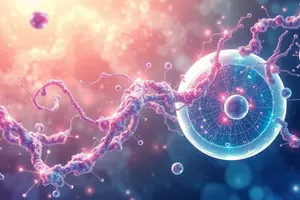Podcast
Questions and Answers
What type of drug interacts with receptors to activate them, mimicking natural substances?
What type of drug interacts with receptors to activate them, mimicking natural substances?
- Agonists (correct)
- Inhibitors
- Antagonists
- Transporters
What is the primary focus of pharmacodynamics in drug action?
What is the primary focus of pharmacodynamics in drug action?
- The study of drug effects on the body (correct)
- The study of metabolic pathways
- The study of drug distribution
- The study of drug absorption
Which class of drugs specifically inhibits the reuptake of neurotransmitters?
Which class of drugs specifically inhibits the reuptake of neurotransmitters?
- Antidepressants (correct)
- NSAIDs
- Beta-blockers
- Antagonists
What is the term for diminished response to a drug over time due to adaptive changes?
What is the term for diminished response to a drug over time due to adaptive changes?
What does a higher therapeutic index indicate about a drug's safety profile?
What does a higher therapeutic index indicate about a drug's safety profile?
Flashcards are hidden until you start studying
Study Notes
Drug Mechanisms
1. Mechanisms of Drug Action
-
Receptor Binding: Drugs interact with specific receptors on cell surfaces to exert effects.
- Agonists: Activate receptors, mimicking natural substances.
- Antagonists: Block receptors, preventing activation.
-
Enzyme Interaction:
- Inhibition: Drugs can inhibit enzyme activity, altering metabolic pathways.
- Activation: Some drugs enhance enzyme activity.
-
Ion Channel Modulation:
- Drugs can open or close ion channels, affecting ion flow and cell excitability.
-
Transporter Proteins:
- Drugs may inhibit or activate transporter proteins, affecting the uptake and release of neurotransmitters or other substances.
2. Types of Drug Mechanisms
- Pharmacodynamics: Study of drug effects on the body and the mechanisms of action.
- Pharmacokinetics: Study of drug absorption, distribution, metabolism, and excretion.
3. Signal Transduction Pathways
- Drugs may initiate a cascade of cellular events following receptor activation, involving secondary messengers (e.g., cAMP, Ca²⁺).
4. Specific Drug Classes and Mechanisms
- Non-steroidal Anti-inflammatory Drugs (NSAIDs): Inhibit cyclooxygenase (COX) enzymes, reducing prostaglandin synthesis and inflammation.
- Beta-blockers: Block beta-adrenergic receptors, decreasing heart rate and blood pressure.
- Antidepressants: Selectively inhibit the reuptake of neurotransmitters (e.g., SSRIs inhibit serotonin reuptake).
5. Drug Tolerance and Resistance
- Tolerance: Diminished response to a drug over time due to adaptive changes.
- Resistance: Often seen in antibiotics; organisms may develop mechanisms to evade drug action.
6. Adverse Drug Reactions (ADRs)
- Side effects resulting from unintended interactions or mechanisms.
7. Therapeutic Index
- Ratio of the toxic dose to the therapeutic dose; a measure of drug safety. A higher index indicates a safer drug profile.
8. Drug Development Considerations
- Understanding drug mechanisms is crucial for developing new therapies, assessing safety profiles, and predicting interactions.
These concepts form the foundation for understanding how drugs work within the body and their potential impacts on health.
Mechanisms of Drug Action
- Receptor Binding: Drugs target specific cell surface receptors to produce effects.
- Agonists: Mimic natural substances by activating receptors.
- Antagonists: Block receptors to prevent natural substance activation.
- Enzyme Interaction:
- Inhibition: Some drugs inhibit enzyme activity, modifying metabolic pathways.
- Activation: Certain drugs enhance the activity of enzymes.
- Ion Channel Modulation: Drugs can regulate ion channels, impacting ion flow and cell responsiveness.
- Transporter Proteins: Drugs may inhibit or activate transporter proteins to influence the movement of neurotransmitters or substances.
Types of Drug Mechanisms
- Pharmacodynamics: Examines how drugs affect the body and their mechanisms of action.
- Pharmacokinetics: Focuses on the processes of drug absorption, distribution, metabolism, and excretion.
Signal Transduction Pathways
- Following receptor activation, drugs can trigger a sequence of cellular events via secondary messengers like cAMP and Ca²⁺.
Specific Drug Classes and Mechanisms
- Non-steroidal Anti-inflammatory Drugs (NSAIDs): Work by inhibiting cyclooxygenase (COX) enzymes, leading to reduced inflammation via decreased prostaglandin synthesis.
- Beta-blockers: Function by blocking beta-adrenergic receptors, which helps lower heart rate and blood pressure.
- Antidepressants: Inhibit the reuptake of neurotransmitters; for instance, selective serotonin reuptake inhibitors (SSRIs) specifically target serotonin.
Drug Tolerance and Resistance
- Tolerance: Represents a decreased response to a medication over time due to physiological adaptations.
- Resistance: Frequently observed in antibiotics; organisms can evolve mechanisms to resist drug actions.
Adverse Drug Reactions (ADRs)
- Side effects resulting from unintended interactions or mechanisms associated with drug use.
Therapeutic Index
- Defined as the ratio between the toxic dose and the therapeutic dose of a drug, serving as a crucial measure for drug safety; a higher therapeutic index indicates a safer drug profile.
Drug Development Considerations
- Understanding mechanisms of action is vital for creating new therapies, evaluating safety, and predicting drug interactions, forming the foundational knowledge for how drugs operate within the body and their health impacts.
Studying That Suits You
Use AI to generate personalized quizzes and flashcards to suit your learning preferences.




